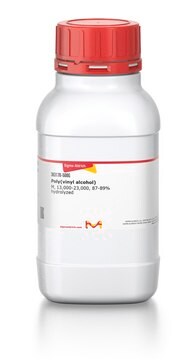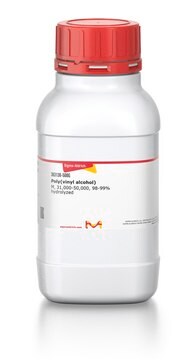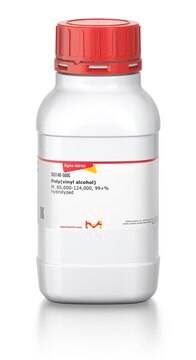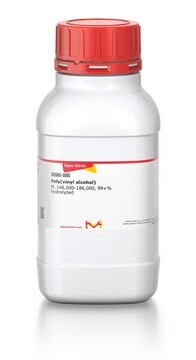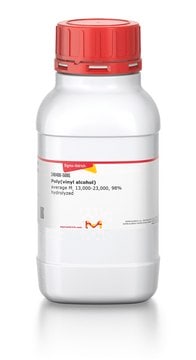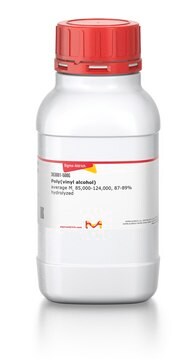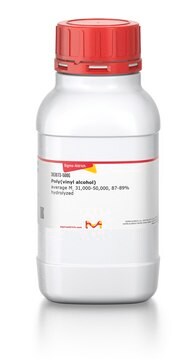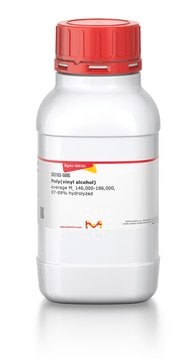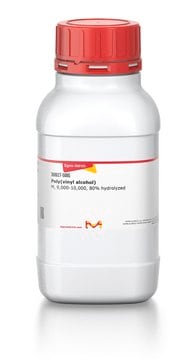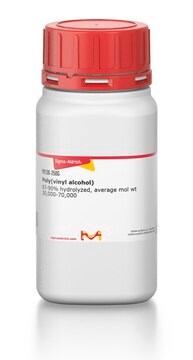563900
Poly(vinyl alcohol)
average Mw 130,000, 99+% hydrolyzed
Synonym(s):
PVA
Sign Into View Organizational & Contract Pricing
All Photos(2)
About This Item
Linear Formula:
[-CH2CHOH-]n
CAS Number:
MDL number:
UNSPSC Code:
12352104
NACRES:
NA.23
Recommended Products
form
powder or crystals
mol wt
average Mw 130,000
falling ball
56-68 cP, 4 % in H2O(20 °C)(lit.)
InChI
1S/C2H4O/c1-2-3/h2-3H,1H2
InChI key
IMROMDMJAWUWLK-UHFFFAOYSA-N
Looking for similar products? Visit Product Comparison Guide
Related Categories
General description
Poly(vinyl alcohol) (PVA) is a vinyl based water soluble polymer that can be used as a non-ionic surface active agent. It can also be used as a biodegradable polymer and can be incorporated in adhesives, coatings, textiles, ceramics and cosmetics. Its properties include good transparency, chemical resistance, toughness and anti-electrostatic properties.
Application
PVA can be used in a variety of applications such as:
- a blended membrane for separation of gases
- a proton conducting membrane for the development of fuel cells
- hydrogels in tissue engineering
Storage Class Code
11 - Combustible Solids
WGK
WGK 1
Flash Point(F)
No data available
Flash Point(C)
No data available
Personal Protective Equipment
dust mask type N95 (US), Eyeshields, Gloves
Certificates of Analysis (COA)
Search for Certificates of Analysis (COA) by entering the products Lot/Batch Number. Lot and Batch Numbers can be found on a product’s label following the words ‘Lot’ or ‘Batch’.
Already Own This Product?
Find documentation for the products that you have recently purchased in the Document Library.
Customers Also Viewed
CO2 separation using thermally stable crosslinked poly (vinyl alcohol) membrane blended with polyvinylpyrrolidone/polyethyleneimine/tetraethylenepentamine
Mondal A and Mandal B
Journal of Membrane Science , 460(6), 126-138 (2014)
Plastics Materials, 386-397 (1999)
Cross-linked poly (vinyl alcohol)/sulfonated nanoporous silica hybrid membranes for proton exchange membrane fuel cell
Beydaghi H, et al.
Journal of Nanostructure in Chemistry, 4(2), 97-97 (2014)
Relationship between micro-porosity, water permeability and mechanical behavior in scaffolds for cartilage engineering
Vikingsson L, et al.
Journal of the Mechanical Behavior of Biomedical Materials, 48(2), 60-69 (2015)
Compostable Polymer Properties and Packaging Applications
Plastic Films in Food Packaging, 217-248 (2013)
Our team of scientists has experience in all areas of research including Life Science, Material Science, Chemical Synthesis, Chromatography, Analytical and many others.
Contact Technical Service
